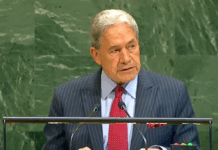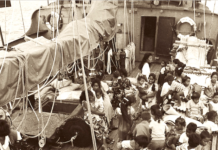Harmeet Sooden is currently in Iraqi Kurdistan, where he has been working with Christian Peacemaker Teams investigating allegations of rising tensions in internally displaced camps and reporting findings to the United Nations organisations operating in the region. In episode 8 of Evening Report we cross to Iraq to talk to Harmeet Sooden before he returns to New Zealand.
-
Programme: Evening Report
Episode: 8
Host: Selwyn Manning
Interviewee: Harmeet Sooden
Location: Iraqi Kurdistan
Duration: 14:20.
New Zealand’s Coalition Partners Worsening Crisis in Iraq
[caption id="attachment_4135" align="alignleft" width="300"] Harmeet Sooden in Iraq.[/caption]
Harmeet Sooden in Iraq.[/caption]
Source: Harmeet Sooden – SULAYMANIYAH, IRAQ – Harmeet Singh Sooden is returning to Auckland Sunday morning, 7 June 2015. He has been working with Christian Peacemaker Teams (CPT), an international NGO that is supporting local and international organisations responding to the humanitarian crisis in Iraqi Kurdistan, arising from the large influx of internally displaced persons (IDPs) and Syrian refugees fleeing the current fighting.
Mr Sooden is part of a CPT team assessing the growing communal tensions within an IDP camp resulting from the deteriorating security and economic situation in Iraq. Following its investigation into allegations of widespread ethno-religious discrimination in the camp, the team met with representatives of UNHCR, UNDP and other key organisations to discuss CPT’s findings and recommendations on how to relieve these tensions. Mr Sooden will continue to work from New Zealand with CPT and relevant stakeholders to develop a social cohesion strategy for IDP camps.
Mr Sooden is extremely concerned that the communal tensions in the camp could turn into communal violence. “One human rights worker has described the communal tensions in the camps and throughout Iraqi Kurdistan as ‘a powder keg’,” he says.
Mr Sooden is also deeply concerned about the Government’s decision to deploy the NZDF to Iraq as part of the US-led coalition fighting ISIS: “The US-led coalition’s military operations are adding to an already high number of civilians killed or displaced. Mass flight is in turn is straining communal relations and overstretched humanitarian services in the camps, as we have personally observed.”
Mr Sooden states, “New Zealand should place the welfare of the Iraqi people as a whole ahead of their own national interests, and not take part in a military campaign that is increasing the level of violence and worsening the humanitarian crisis in the region.”
Mr Sooden says, “Human rights groups have implicated New Zealand’s coalition partners in committing serious human rights violations that may constitute war crimes. The partners include Iraq whose forces are being trained by the NZDF.”
Mr Sooden also says, “According to major aid agencies, both the strategy of the US-led coalition and the severe shortfall in funding are compounding the humanitarian crisis in the region.”
“If this trend continues, it might be catastrophic for people across Iraq,” he warns.
Accordingly, Mr Sooden concludes, “As a ‘responsible international citizen’ and member of the UN Security Council, NZ should work independently of the US-led coalition and push for a UN-mandated mission, while increasing its humanitarian aid contributions and intensifying its diplomatic efforts to address the root cause of the conflict.”
Mr Sooden is also appealing to the Government to be more transparent about the measures it is taking to address the ISIS threat: “New Zealanders should be kept informed about the efforts the Government is putting into resolving the conflict.”
“My great-grandfather fought and died for British interests in Mesopotamia during WWI. Now, our Government is risking the lives of our troops in Iraq, this time mainly to serve the interests of New Zealand elites. Sadly, not much has changed a century later,” he adds.
Background Information:
In 2005, while participating in an international CPT delegation, Mr Sooden and three colleagues were kidnapped in Baghdad and held for almost four months. Mr Sooden says the rise of ISIS reminds him of his own ordeal: “Seeing the hostages in orange jumpsuits brings back memories of Tom.” Tom Fox, one of the three held with Mr Sooden, was executed on 9 March 2006. Mr Sooden and the remaining hostages, Canadian James Loney and Briton Norman Kember, were freed two weeks later. According to the US Government, indications are that al-Qaeda in Iraq (AQI), the direct forerunner of ISIS, was responsible for the CPT kidnapping.
CPT is an international NGO composed of trained human rights workers who protect human rights and promote conflict resolution in conflict zones around the world. CPT has had a presence in Iraq since October 2002 at the request of local NGOs – first in Baghdad and then, from 2006, in the Kurdish north. It is a small but important part of a large non-violent movement in Iraq. Investigative journalist Seymour Hersh, who helped to expose the Abu Ghraib torture and prisoner abuse scandal in 2004, has acknowledged the work of CPT: “[M]ost of the things that I ended up writing about in Abu Ghraib, most of the general concepts, they knew a great deal about earlier.” CPT’s work with detainees has also been commended by the ICRC and UNAMI.
The International Committee of the Red Cross (ICRC) has stated that US-led “air strikes in Iraq and Syria have compounded the humanitarian consequences of the conflicts in both countries.” Both the ICRC and the UN World Food Programme warn the coalition strategy to retake ISIS-held population centres could greatly worsen the humanitarian crisis. Amnesty International and Human Rights Watch continue to implicate the Iraqi Government and government-backed militias in war crimes and exacerbating sectarian tensions. According to the organisation Iraq Body Count (IBC), “[t]he rise of [ISIS] as a major force in the conflict, as well as the military responses by the Iraqi Government and the re-entry of US and Coalition air forces into the conflict, have all contributed to the elevated death tolls”.
The United Nations Assistance Mission to Iraq (UNAMI) has stated “there is ‘general agreement,’ not just in the UN but in Iraq as well, that the security element of dealing with [ISIS] is [just] one part of the solution…to the problems facing the country”, but “an inclusive political process [is] vital to finding comprehensive solutions”.
—
]]>





